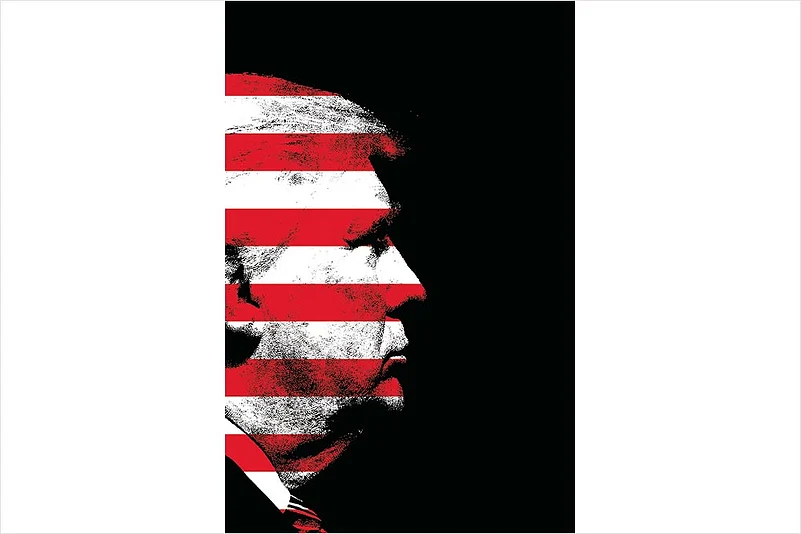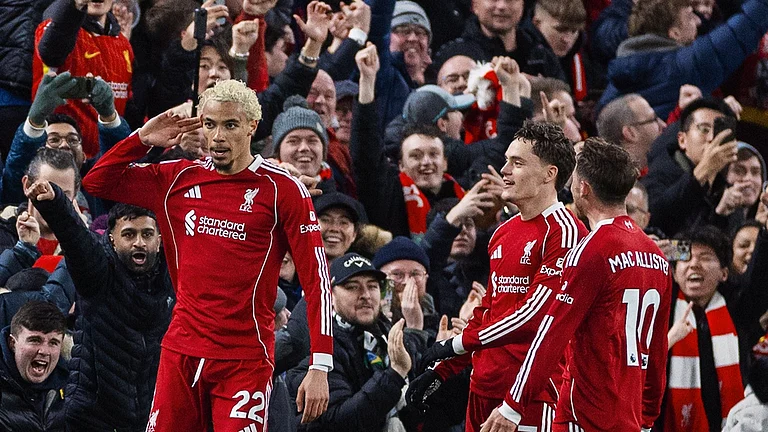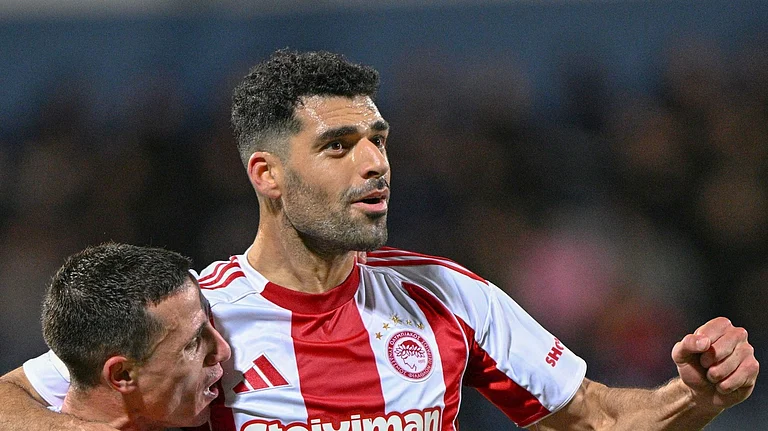Alt Right Delete. The phrase has been buzzing around bemused social media handles for a couple of days now. One barometer of how disruptive the Donald J. Trump victory in the US election has been lies way beyond its shores. World capitals had been, by and large, preparing for another spell of a Democrat presidency—their horizon of expectation was painted around a degree of continuity in American foreign policy. The arrival on stage of a classic ‘outsider’ figure—a man whose stance was either inward-looking or unpredictable—comes as a black swan event.
World leaders can be expected to go into a huddle with their advisors in their respective capitals. But the first noises were one of candid disquiet. “Looks like this will be the year of the double disaster of the West,” was how former Swedish foreign minister Carl Bildt worded it. Alluding to Trump’s victory and Brexit in June, he tweeted, “Fasten seat belts”.

The Trump campaign HQ in New York was a happy place that night
The element of disquiet was not surprising. During his campaign, Trump’s many outrageous statements made him a totem of fear—or the butt of jokes—in America and elsewhere. None of the statements of intent were fleshed out, but now that he is president-elect, everyone is revisiting his remarks to parse them for any reliable sign of how things may move. His promises were legion: denying entry of Muslims into the US; building a wall along the Mexican border to keep illegal immigrants out; bringing back jobs from China and India; renegotiating America’s trade deals, including the North American Free Trade Agreement (NAFTA); withdrawing from WTO; putting up tariff barriers to counter cheap Chinese goods flooding US markets; reducing America’s overseas military role and forcing its NATO and Asian allies to pay for their own security.
All that put together, if brought to fruition, can cause a few shocks to the very fundamentals of world diplomacy. Add to that his idea of reaching out to Russian President Vladimir Putin so that both countries can have a non-adversarial relation and cooperate in areas like fighting ISIS, and the stable idea of ‘the West’, a cohesive coalition of interests going back a century, gets ruffled up. None of this may come to pass. Most of Trump’s remarks were aimed at a domestic constituency of Americans who had lost out in the globalisation process and were left embittered by the US’s rising wealth gap. But if even a fraction of his protectionist ideas turn into policy, the result could be a series of trade wars, further aggravating the health of the global economy.
Many countries like India, however, also see an opportunity in what he had said. Anyway, the concerns did not stop congratulatory messages for Trump from pouring in, with governments duly expressing their desire for harmonious ties. Prime Minister Narendra Modi also joined the ranks on Twitter, before calling up Trump personally to congratulate him. “We appreciate the friendship that you have expressed during your campaign. We look forward to working with you closely to take Indo-US bilateral ties to a new height,” Modi tweeted. President Pranab Mukherjee, a former foreign minister, was equally effusive. “Your victory is a celebration of the spirit of individual heroism that has always defined the American national identity...and pluralism,” he wrote.
All this is a far cry from the scenario predicted by political pundits in the US: a deeply divided Republican Party forced to sit out, at least for four years, not only under a Democrat president but also a Congress dominated by Democrats. Most capitals agreed with this assessment. But today, the US is not only under a wildcard Republican president, but the House of Representatives and the Senate is also under the party’s control, bringing the two wings of US policymaking—the executive and the legislature—under one party. The resulting cohesion can itself have foreign policy implications.
Daniel Twining, director of US’s German Marshall Fund and a former official in the George W. Bush administration, seeks to allay apprehensions. “I think the world can expect a more nationalist America under Trump, but this need not mean a more isolationist one,” he says. Trump’s call “to make America Great Again” suggests he is sufficiently invested in the old idea of the US’s leading role in world affairs, Twining adds. “His lament during the campaign that ‘we don’t win anymore’ plays to public sentiment here that China, Russia and ISIS have walked all over American interests during the Obama years, and that it’s time for those powers to respect and fear us again.”
Trump’s campaign saw some of the most vulgar, divisive and xenophobic moments in America’s recent political history—Women, Muslims, Blacks, Hispanics, Chinese, Indians, most non-white foreigners as well as adversaries within the GoP and outside—all were subjected to furious tongue-lashing. He was caught on tape, making lewd comments not only about other women but also about his own daughter. And yet, the popular rage against the old order was such that he was preferred over Hillary Clinton, who was seen as part of the establishment that caused so much misery.
The ascension of a radical, ultra-right, xenophobic leader in another country might have only fleetingly made headlines. When it’s America, the impact can be felt all over the world. Seen through the lens of Indian foreign policy interests, however, the picture is not as gloomy. “Trump is a clear admirer of India, so I believe that relationship will be fine,” says Twining. South Block mandarins agree. A Trump victory, though unexpected, has enthused New Delhi’s policy planners about exploring new opportunities for leverage. His disparaging, critical remarks about Pakistan—combined with a shared distaste for Islamist terror—makes for a certain convergence.
In Pakistan, it’s being read as a triumph of Islamophobia. “I think Pakistan and Pakistanis are as shell-shocked on Trump’s victory,” says commentator Ayesha Siddiqa. “This means those who feel there is a larger conspiracy to destroy Muslims and a Muslim Pakistan would now have more to chew on as ammunition,” she adds.
Indian policy experts are keen to press on the advantage, on “the early bird catches the fish” logic. Diplomats are suggesting that India should extend an invitation to Trump to visit the country. This, MEA officials feel, could work in India’s favour, as most countries are still wondering how to deal with Trump, who will assume office in January.
But there are a few variables before that. One, though Trump could be favourably inclined towards India, it won’t be on top of his priority list. Two, electoral rhetoric is not quite policy. The direction Trump the president takes would depend on the advisors and officials he picks to assist him in foreign policy, defence, trade, immigration, interior and other areas. And many prominent Republicans, with whom Indian officials are familiar, might be reluctant to join his team. If Trump brings in fresh faces, Indian diplomats would have to build personal equations before they could expect any meaningful engagement.
There are other areas that can go either way. Bilateral warmth may not by itself compensate for the losses a protectionist America can cause. “There are both opportunities and challenges to deal with in this new American administration,” says strategic commentator C. Raja Mohan. “Immigration visas for IT workers and trade are both important issues for us and they need careful negotiations.”
Beyond the bilateral, even a larger geopolitical shift can impact India. Trump has spoken about reaching out to Putin—to the extent that there were dark whispers in the American liberal commentariat about the shadow of the Russian intelligence on the polls. With the backdrop of testy vibes between Putin and Hillary, it was ensured that Russia would reciprocate Trump’s idea of this unlikely comradeship. “There is hope for a new beginning in US-Russia relations, based on national interests rather than on values and ideology,” says Dmitri Trenin, head of Carnegie Endowment for International Peace in Moscow. “Kremlin looks forward to a man-to-man, no-nonsense, transactional dialogue with Trump,” he adds.
The implications for Europe, for NATO, the Middle East or the rest are obvious. But for India, which was occasionally stressed trying to balance its ties with both countries in a zero sum game, this is good news. With the additional attraction that if Putin’s relations with Washington turn non-adversarial, Russia’s dependence on China could lessen. Not having to look over its shoulder at budding Moscow-Beijing ties, or contemplate what joint exercises in Gilgit-Baltistan mean, is a relief.
One step closer, Sino-American relations under a Trump presidency will also be key—with all the attendant complexities surrounding New Delhi’s own ties with China, with or without the Pakistan hyphenation. “China may view Trump’s presidency both as an opportunity and challenge,” says Dingli Shen of China’s Fudan University. “Being a successful businessman, Trump will lead America where it can have a successful business relationship with China. This doesn’t necessarily mean competition; it can well be collaboration.”
Or both. Trump may well ask China to balance its trade with America and can possibly use sanctions as a bargaining chip, Shen admits. “However, with WTO arbitration as a buffer, Beijing and Washington shall be able to charter the waters ahead and reach a mutually beneficial compromise.”
What can worry India and old American allies in Asia, like Japan and South Korea, is the hands-off policy Trump may pursue on the Asia-Pacific, preferring to let the countries to sort out their security issues with China by themselves. If China gets a freer hand to reorder the structure in this crucial region, say, in exchange for some other deal of interest to Washington, it could not only marginalise its rivals, it would have negated many of the assumptions on which previous policy decisions were taken by New Delhi.
The new unpredictability can have long-term effects. “While Americans are stunned by their own election, it’s likely that policymakers across Asia are developing strategies to cope with the uncertainty Trump has introduced to US’s Asia policy,” concedes Sheila Smith of Washington’s Council for Foreign Relations. She feels Japan’s PM Shinzo Abe will face a “fatal setback” in his advocacy of the Trans Pacific Partnership (TPP), which Trump disdains. Tokyo will face renewed attention on burden-sharing in the alliance, though some analysts see this as the opportunity Abe needed for a more independent role on security issues without waiting for US approval.
The greatest worries, however, devolve on Europe, traditional allies of America. Trump’s remarks on reducing the US role in NATO and his stress on the need for Europe pay for its own security has created serious disquiet. “I am sure that as Trump settles down in the president’s role, a number of people will try and educate him,” says Josef Janning, head of European Council for Foreign Relations in Berlin. “But serious concerns remain because of his publicly stated policy towards Europe and NATO.”
The gloom Trump’s isolationism and desire to retreat from old alliance commitments brings can only deepen as European capitals watch the thaw with Moscow. “We don’t expect any help from Trump to keep Europe together,” says Janning wryly. It will be a while before anyone can weigh what the black swan brought.

























